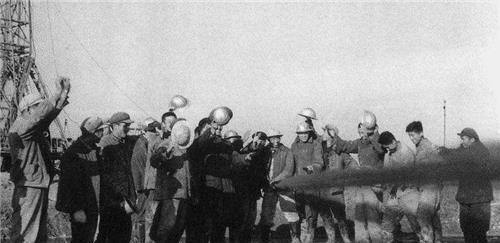It has been 75 years since the Second World War, but it is still vividly remembered. Not only did it cause tens of millions of casualties, but it also caused a lot of resource loss, at least more than $5 trillion was wasted. One of the resources is related to the military lifeblood of various countries, that is, oil. The absence of oil was worse than a lack of food, and Japan suffered at that time.

As we know, Japan is an island country with a small territory. Although after the Meiji Restoration, the comprehensive national strength has developed greatly, but the local resources have been scarce. That is why a war of aggression was launched against China.
Japan has long been salivating over China's resources. As early as the beginning of the Sino-Japanese War in 1894, Japan had already planned how to invade Chinese territory step by step, and the Japanese army first targeted the three northeastern provinces of China.
On the night of September 18, 1931, the Japanese Kwantung Army blew up the South Manchuria Railway tracks near Shenyang's Wicker Lake, and gave it to the Chinese army in a disgraceful way. You say you can fight, and there are so many plays.
However, it has to be said that the Japanese army was prepared and very strong, and in February 1932, the whole territory of the northeast fell. It also established a puppet state of Manchukuo in the northeast and began a 14-year-long colonial rule.
The reason why the Japanese army took the lead in invading the three northeastern provinces of China, in addition to occupying important strategic positions, paid more attention to the geological resources of the three northeastern provinces, especially oil. Why did Japan want to drag the United States into World War II? It is not because the United States has imposed resource sanctions on Japan and does not sell oil to Japan. The Japanese had no choice but to take the plunge and blow up Pearl Harbor.
Therefore, after the Japanese army occupied the three northeastern provinces, some of the troops undertook the burden of finding oil. Because oil is the lifeblood of the Japanese army, without oil their aircraft and tanks will be unable to move. However, we know that the Japanese army has searched for fourteen years and has not found the Daqing oil field, and even japan has concluded that there is no oil at all in northeast China.
But the face punch often came quickly, and in February 1960, the Northeast Songliao Petroleum Conference began. The photo of Iron Man Wang Jinxi stirring cement slurry with his body was instantly popular all over the country, and the news of China's oil production also spread to the world for a while. When the Japanese heard the news, they were so angry that they patted their thighs.
The "Modern History of Japan" even shows that if they had found this oil field, they would rewrite the history of World War II. If it is too fake, then they have been tinkering with the northeast for so long, why did they not find the oil field in the end? Some Japanese experts are naturally very concerned about this issue, and they have come to conclusions.
First of all, the Japanese are not sophisticated in oil extraction technology, take the Daqing oil field, the location of the oil layer is about 900 meters to 1200 meters deep, but the depth drilled by the Japanese is less than 800 meters. They are still half a playground away from the oil field, how can they be exploited?
Of course, there is also a reason for the deviation of the theory. At that time, a lot of oil appeared in the coastal areas, theoretically Speaking, China belonged to the "oil-poor country", not only japan at that time many big countries thought so, so the Japanese army at the beginning with a "fluke" mentality to try luck, naturally it could not be exploited. But fortunately, the Japanese army did not mine, otherwise the consequences would be really unimaginable.